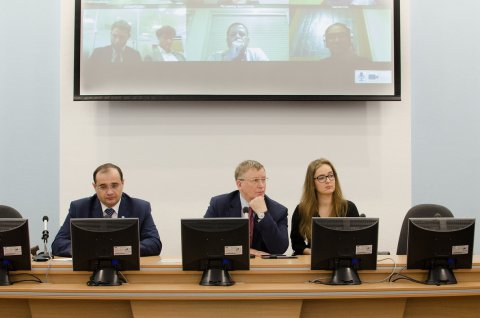In the beginning of March, the leadership of South Ural State University discussed the most important results of the university’s first year of work in the 5-100 Project and the summary of the university’s activities in 2016 with the members of the International Research Council through on a teleconference.
Doctor Jaewan Kim, doctor Panayiotis A. Koutentis, doctor Thomas Ludvig, doctor Muthupandian Ashokkumar, president of Emerson, Edward L. Monser, and representatives of the international consulting company PwC participated in the online-meeting.
“Today we are working with researchers from all around the world: the USA, Europe, Australia, and South Korea. Together, we are very seriously preparing for a presentation of our work in Moscow,” noted SUSU rector, Aleksandr Shestakov.
Director of the SUSU Higher School of Electronics and Computer Science, Gleb Radchenko, presented a summary of the university’s activities for the last year in English. In the presentation he demonstrated the results of the main areas of the university’s development – new educational techniques, breakout technologies, and regional innovations and developments.
“Having a meeting of the International Science Council in this format was a unique occasion for our university. Each member of the Council stated their opinion. Our dear colleagues noted that the university’s main achievements for the last year were the successful reorganization of the university, and suggested that these indicators be very clearly presented in the main presentation in Moscow,” said Gleb Radchenko.
The main point of the university’s reconstruction was to focus our strengths on the goals set within the 5-100 Project. One of the most important was to form a modern, effective university structure in accordance with international standards and best practices. As a result, 10 Higher Schools and Institutions were formed at SUSU.
In addition, the university completed serious work on the introduction of measures to support young scientists. There were 4 open competitions for researchers, the results of which were tallied by independent experts from outside the university. Financial support was awarded per the results of these contests – 30 young researchers received 400,000 rubles, 30 post-graduate students received 200,000, and 20 students received 50,000 ruble microgrants. In addition, a group of young specialists with an average age of 37 years old were brought to the university to work as leaders of projects of the university’s road map within the 5-100 project.
In 2016, SUSU founded the International Research Council and the Supervisory Council. The former includes 10 leading international researchers under the leadership of international expert in manufacturing innovations, president of the Emerson corporation, Edward L. Monser. The Supervisory council includes 11 leading Russian experts of manufacturing and representatives of the government. The first meetings of each of these councils were held at the end of 2016.
In the preceding year, a huge amount of attention was paid to the implementation of a project management system dedicated to increasing the efficiency of staff’s work and improve project results. The leadership formed concrete criteria for evaluating project efficiency and to recognize staff and a KPI system was implemented.
An important indicator of efficiency of the university’s work within the 5-100 Project was the notable increase in the average citation and quality of publication activity. Work by our researchers has been published in leading scientific journals around the world.
SUSU prepared the first large, open online courses, four of which will be released on the open education platforms Lectorium and EdX this year. In addition, the university’s leadership is actively developing a system of distance education, stimulating the expanded use of the technology in education, and is planning on enabling supercomputer database access for each student through mobile platforms.
For even more effective education of students with excellent academic results, 14 advanced training groups were formed at SUSU. Talented students will have a chance to study fundamental and complementary disciplines and take part in interdisciplinary scientific research. The university s actively implementing an English-speaking environment to increase our alumni’s competitiveness.
This goal-oriented work for increasing the quality of education allows the university to assist the region’s economy with small, innovative businesses, modern engineering solutions, and highly-qualified specialists. All of these points were reflected in the presentation before members of the International Research Council.

Having gotten acquainted with the results of the university’s work in 2016, the International Research Council decided unanimously that the university is moving in the right direction and the results of its activities are being used widely. Participants of the online meeting approved the trajectory of the university’s development and put forth their recommendations to further improve SUSU’s work efficiency.
“We see that the SUSU International Research Council is deeply interested in our work. It provides real help for our development. We are already preparing for our presentation at the Russian Ministry of Education and Science in October, where we will fight for big projects for the university to realize in 2018-2019,” said SUSU rector.
According to Aleksandr Shestakov, future plans for the university include continuing work in founding international laboratories and programs for motivating young researchers. The university will participate in international bleeding-edge projects for the development of technologies and science and will actively enter the international educational space.




